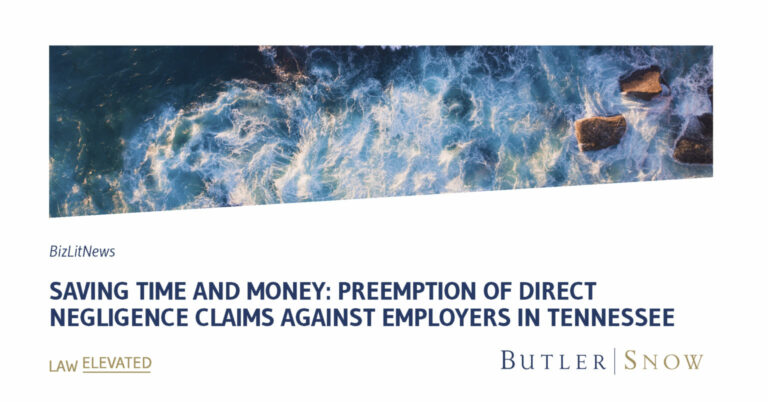Although Tennessee courts recognize claims asserted against an employer such as negligent hiring, training, supervision, and entrustment, recent case law suggests that those claims may no longer be viable after an employer admits that it may be held vicariously liable for an employee’s conduct, otherwise known as the Preemption Rule. This represents a direct departure from a 2016 Tennessee Court of Appeals opinion that originally rejected the Preemption Rule.[1] However, the Tennessee Supreme Court summarily vacated the Court of Appeals on procedural grounds without discussing the Preemption Rule. Practically speaking, this meant that, from a legal standpoint, the Preemption Rule remained unaddressed by state courts in Tennessee.
In 2015, the United States District Court for the Eastern District of Tennessee found that the Tennessee Supreme Court would adopt the Preemption Rule and dismissed the direct negligence claims asserted by the plaintiffs against a company that admitted vicarious liability for the conduct of its employee.[2] In 2020, the United States District Court for the Middle District of Tennessee recognized that for all intents and purposes, Tennessee state courts had not addressed the applicability of the Preemption Rule, and agreed with the Eastern District’s rationale and dismissed plaintiff’s direct negligence claims against the employer after the employer admitted vicarious liability for any negligence attributed to its employee.[3] As recently as January 2022, the Middle District once again decided to apply the Preemption Rule and predicted that the Tennessee Supreme Court would adopt the Preemption Rule.[4] However, the Middle District clarified that the Preemption Rule would not apply in the event that a plaintiff claimed punitive or exemplary damages.
Direct negligence claims against an employer are often followed by burdensome discovery requests for internal documents that are wholly irrelevant to the plaintiff’s claims and time-consuming preparation for corporate representative depositions to discuss general business practices. Practically speaking, the recent decisions in support of the Preemption Rule provide employers with the ability to potentially streamline the issues in a plaintiff’s complaint to focus solely on the negligence claims against the employee, thereby saving time and money.
[1] Jones v. Windham, 2016 WL 943722, at *5 (Tenn. Ct. App. Mar. 11, 2016), appeal granted, judgment vacated (Aug. 19, 2016).
[2] Ryans v. Koch Foods, LLC, 2015 WL 12942221, at *9 (E.D. Tenn. July 8, 2015).
[3] Freeman v. Paddack Heavy Transp., Inc., 2020 WL 7399026, at *3 (M.D. Tenn. Dec. 16, 2020).
[4] Teil v. Rowe, 2022 WL 187824, at *2 (M.D. Tenn. Jan. 20, 2022).
